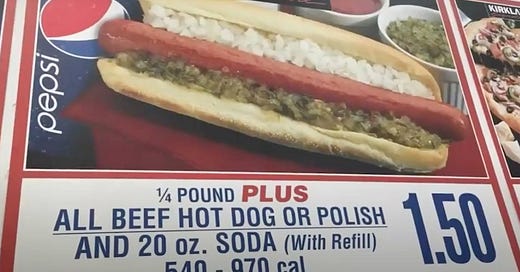Sell Your Hot Dogs at a Loss
How we spend money is as important as how we save it. Because we don't express our truest selves with a 401(k) statement the way we can with a debit card.
What is the meaning of money if you never happily spend it?
In Kitchen Confidential, Anthony Bourdain famously wrote,
"Your body is not a temple, it's an amusement park. Enjoy the ride."
His point is that life is too short to unnecessarily restrict ourselves to some sacred ideal. Life should be enjoyed. It's okay to eat a hot dog once in a while.
For those of us fortunate to have disposable income, we have the choice to save or spend it. A purely financial perspective favors saving. But to live a happy, well-balanced and rich life, an equal measure of focus should be directed toward spending. What looks best on a balance sheet doesn't always translate to long-term value.
Speaking of hot dogs, what perfectly illustrates this idea is a business story about hot dogs. Not just any hot dogs. Costco hot dogs.
This is the Costco hot dog story.
Since 1985, the big-box retailer has charged $1.50 for a hot dog and pop (or soda for you Ivy League elitists) combo. One day, then Costco president Craig Jelinek protested to co-founder and former CEO Jim Sinegal that the cheap meal combo was costing the company money. The sensible thing to do was to raise the price. Sinegal considered Jelinek's pragmatic position, and then delivered a curt, passionate, don't-want-to-be-misunderstood response.
"If you raise [the price of] the effing [fucking] hot dog, I will kill you," Sinegal said. "Figure it out."
Jelinek ultimately did. Costco created its own hot-dog making factories to lower production costs. But why was it so important to retain the low price even if it meant losing money? As Jelinek said in an interview: "It's the mindset that when you think of Costco, you think of the $1.50 hot dog."
In other words, the $1.50 hot dog is synonymous with the Costco brand. The money-losing frankfurter is a part of the company's identity. It is a staple for customers to recharge after buying five pounds of Cinnamon Toast Crunch, 50 rolls of toilet paper and a coffin.
There is a unique identity to all of us, too. And how we spend money on expressing that identity has been shown to enrich our lives.
Researchers at the University of Cambridge analyzed 76,000 transactions of 625 customers at a U.K. bank. Each purchase was grouped into 59 separate categories and matched to one of the Big Five personality traits.
Big Five Personality Traits
Openness to experience
Conscientiousness
Extraversion
Agreeableness
Neuroticism
For example, money spent on traveling might be identified as openness to experience.
Participants in the study were also asked to rate their feelings of life satisfaction. What the study found was that participants who made purchases that most closely matched their personalities were more satisfied with life. What's more, that personality spending-life satisfaction relationship materialized regardless of income, age and gender. It had a greater impact on life satisfaction than total income or total spending.
As the study's authors explain:
“Money enables us to lead a life we want... psychological fit helps individuals to act in line with their most fundamental needs and preferences as well as to express themselves in a way that maintains and enhances their self-concepts.”
Put simply, spending money on things (experiences and material items) that align with our personalities make us happier.
Therefore, one way to boost life satisfaction is to think of what you spend money on that is synonymous with your personality. Consider these expenses your "hot dogs." Shamelessly sell them at a loss. That is, spend money freely on the things that matter most to you. At the same, slash costs unrelentingly on all the things that don't.
To be clear: I am not advocating for a green light to spend money mindlessly. Saving is the foundation of financial security upon which happiness is built through spending. I am only saying that we should be as mindful of spending as of saving to live the life we want.
Sadly, the author Larry McMurty died last week. An interesting note from his obituary was that he had amassed a library of 30,000 books stored in three houses. Surely, that makes little sense from a cost perspective alone. But he had the resources, and books were his life.
"I doubt it matters where you die, but it matters where you live."
Larry McMurty, Lonesome Dove
Life is too short to agonize over every dollar spent, especially on things that make life satisfying, or to stress over every financial decision when completely unnecessary to the bigger picture.
These are what Ramit Sethi, author of I Will Teach You To Be Rich, calls $30,000 questions. Instead of exploring how to save $3 on a good cup of coffee, explore ways to increase your salary by $30,000.
So, sell your hot dogs at a loss -- and enjoy all the ways in which it helps you profit.




